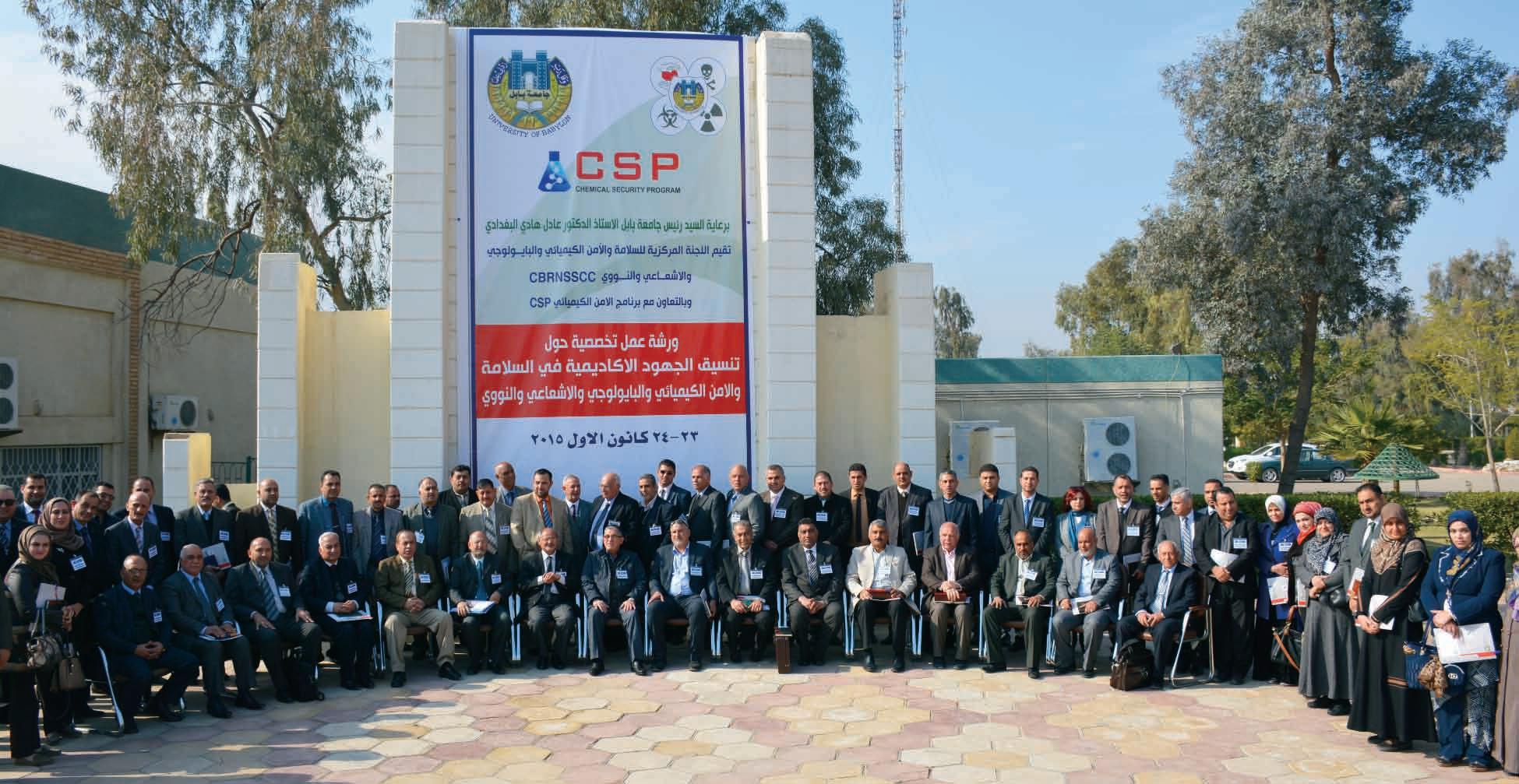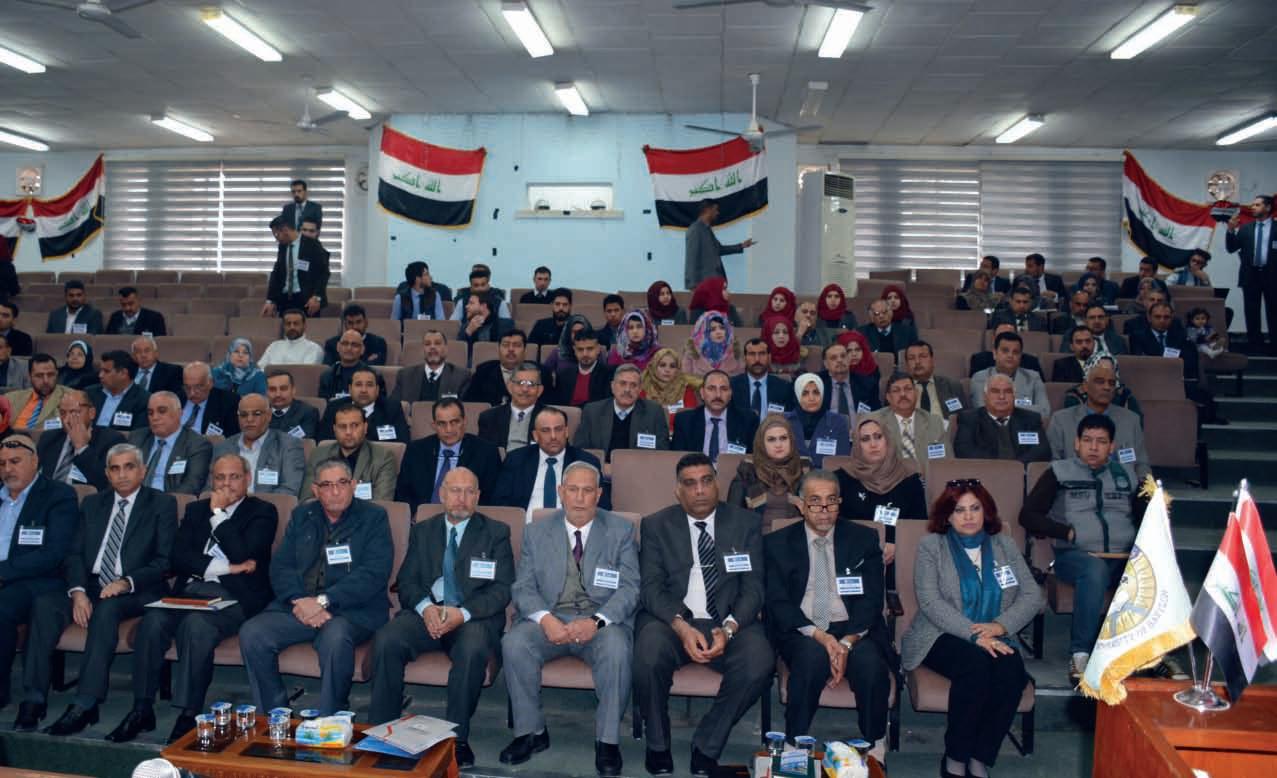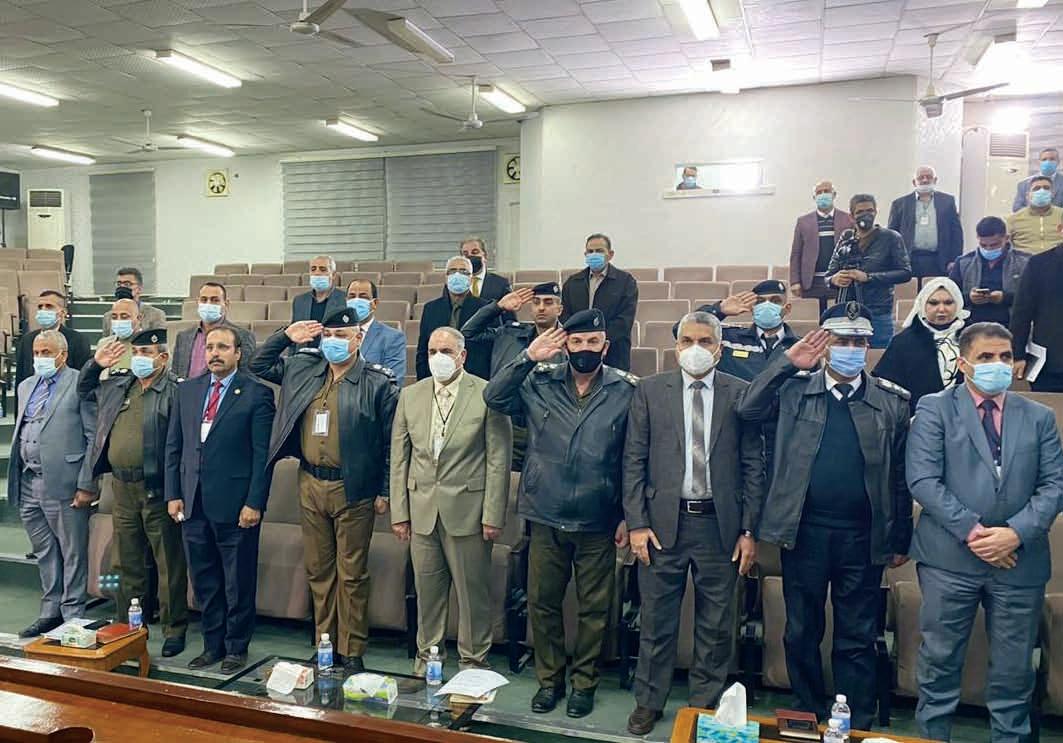
12 minute read
A higher education
Professor Falah H Hussein, emeritus professor at the faculty of pharmacy, University of Babylon and member of the ministerial CBRN committee in the ministry of higher education and scientific research talks about his plans
GW: How did the University of Babylon (UoB) get involved in CBRN? What of its research are you looking forward to seeing come to completion? Is it on track to become an international university this year, or has Covid killed that? FH: In 2008, various US government partners associated with the department of defence and state department’s cooperative threat reduction (CTR) chemical security programmes, initiated capacity building efforts to train Iraqi scientific cadres to better understand and implement chemical and biological safety and security practices. As a graduate of Nottingham University in the UK, I have long been aware of the importance of this subject as it concerns the life of students and teachers, and have joined many seminars inside and outside Iraq to develop this programme. The UoB noticed my great interest in this area and recognised the value and importance of making progress in chemical (and later CBRN) security. In 2014 UoB decided to build an ideal chemicals store, where many dangerous chemical materials are held, and in 2015 a national symposium was launched, which attracted many chemical, biological, radiation and nuclear security specialists. UoB like other Iraqi universities, takes safety and security measures in labs and public utilities very seriously. To this end, a central committee was formed to monitor the safety of all dangerous and prohibited materials. The great support of the UoB president and their scientific assistance has established the University of Babylon as a pioneer and leader in Iraqi CBRN safety and security since 2008.
Advertisement
Right from the start of the project, UoB has put a lot of effort into outstanding scientific progress. The UoB’s leadership is very concerned about international rankings and takes all necessary steps to ensure a place in the distinguished scientific hierarchy of Iraqi universities. Despite the spread of Covid-19, the UoB, has experienced no negative impact whatsoever on the scientific
The audience for the conference has grown year on year ©Falah Hussein
progress that plays a prominent role in helping our community combat and avoid the virus. At this stage of the pandemic, the CBRN team is taking all necessary measures to help all citizens be fully aware of its [potentially] fatal consequences.
The most important subject that I'm looking forward to seeing in Iraq is the establishment of a CBRN centre that can serve as a central institute to continually monitor, understand, prioritise, support, and coordinate technical and policy education surrounding CBRN safety and security competencies.
GW What kind of centre is it going to be? Will it be science or training based, or both? FH: Currently we have no CBRN centres in Iraq and I always say that this is my dream! Having the centre will ensure a training venue for the ministries of defence and the interior, and all other security ministries. It will be led by CBRN professionals and will increase people’s abilities in many areas. How can we control the border? How can we control the sale and purchase of hazardous materials? How do we monitor the movement of hazardous material from when it enters Iraq through the supply chain, whether it’s in transit elsewhere or used in an end product?
This centre will provide practical training for our people and will need subsidisation from the international community in two ways. The first subsidy is for the tools and the second is to train the staff and leadership of this centre, not only in advanced institutions in Iraq but also in Britain, Germany, or the US. Another element, and one of the most important, is how does this centre get certification that is accepted by the national and international community? Any certificate that is not recognised by the international committee, is worthless.
We have the human resources, specialists in biosafety and security as well as chemical, nuclear, and radiation, it’s the tools and acceptance from the international centres that we need. Once we are established and respected then we can call or invite experienced people from outside Iraq to give lectures or seminars. For the past six years we have been trying to establish this centre, but there has been a lot of government indifference. Now I have decided to establish it privately without government support. We have the land, the infrastructure, and the people, even if we don’t have the government.
GW: Is this going to be low level awareness training, where you will probably have many hundreds of people needing training? Or is this at a more advanced level, where you might perhaps have tens of people? All of this impacts the type of facility that you build. FH: Currently we have no centre, so I think that when we have it
thousands of people will be trained! When you look at the size of the audience, it includes people working for the ministry of defence, ministry of interior, the border staff that check goods entering or leaving Iraq, and those working in customs on desk jobs. It will also help people working in the oil ministries, analytical chemists, and many industries. All these people need to be trained on CBRN regulations.
GW: Would this will be something that you will provide, for example, to people like General Mahmoud Delli and his civil defence force? Or will they have their own training facility and you’ll deal with other agencies? FH: I don't mind! I'll be very glad if any of these ministries like the idea and run with it, because even if the CBRN basics are the same, the rest will be unique for all the ministries. People and infrastructure need regulations on safety and security that are dedicated to them, as do the people working in the ministry of health. The specialisations will need to be written specifically for them, but the basics are for everyone.
GW :You work with both the University of Babylon and AlMustaqbal University College, and chair both CBRN committees. Do they both want to be of international rank and is there one that specialises in CBRN regulations? FH: My primary ambition is to help both the UofB and the College of the Future reach international ranking not only because I belong to them, but because they really deserve prominent ranking. They strive to implement all the measures needed for CBRN. I would like to see the UofB at the top of the rank of state universities and AlMustaqbal University College at the top of the rank of private universities. To be honest the leadership in both institutes are working on that and they’re capable of reaching this goal.
GW: Do they have different foci within CBRN? Is, for example, one looking at basic research and the other looking at applied research, one on chemistry and the other on biology? How do they fit into that CBRN research space? FH: They are both interested in all of CBRN. Babylon University has a radiological and nuclear focus, and Al Salam University concentrates on chemical and biological, but we are working on a curriculum and compulsory subjects for people who need skills in safety and security. Undergrads and postgrads would need to pass this compulsory course.
GW: Has the improvement in the security situation in the north meant that CBRN has moved down a level in priority? FH: Priority is given to CBRN in all circumstances. The improved security situation does not mean that the strict adherence to CBRN safety and security moves to a secondary level due to local change, risk is everywhere in all communities.
After Daesh entered the north of Iraq, they used chemical weapons and we found that they were concentrating on chemical stores and laboratories to access more chemicals to use as weapons to harm the people. The government and friends of Iraqi tried to overcome this problem and we did a workshop via the CTR, with a great deal of training. We included intensive courses about chemical and biological safety and security, so they are capable of protecting their laboratories and their chemical and biological stores. As you say the security situation has calmed in the north and everything is under control.
GW: Daesh made a mess of Mosul University. Have you managed to work with them to try and resolve some of the legacy problems there? FH: The University of Mosul was one of the most august universities in Iraq for a long time. Though ISIS did its best to destroy it completely, the university regained its glory very quickly following the expulsion of those criminals. What helped was the significant efforts of the ministry of higher education as well as all other universities including the UoB. I helped the University of
Mosul benefit from assistance offered by international organisations via the CBRN central committee at the university and also encouraged the university cadres to participate in all local and international scientific workshops especially those involving CBRN. This culminated in outstanding participation of its cadres in those workshops.
GW: You have been working on a national CBRN conference for four years. How have you seen the conference grow? What are you hoping to achieve from this one, and how will 2021’s be different? FH: The first national conference was held in 2016, when there were 210 participants, mostly from the ministry of higher education and scientific research. It was quite difficult to convince other ministries, especially the security ones to send their employees to the event. Also the security ministries did not give approval for such conferences. Despite their refusal, we decided to hold the second conference in 2017. There were more participants at this conference and that increased over the following years. When the security agencies and ministries were certain that the University of Babylon was an authentic and credible stakeholder and highly qualified in dealing with CBRN and spreading governmental and community awareness of its importance, they started sending delegates to these events. Moreover, the university began creating new relationships in many different sectors to enhance security. This is, of course, is in line with conferences’ strapline: We all work together for a secure Iraq. Due to the increasing number of foreign participants, a decision was taken to convert the conference into an international one. This goal was achieved and the number of delegates increased to 615 from 21 countries.
GW: What happens to the conference findings in the months after it takes place? Are there teams of people working on deliverables like mitigating market gaps or vulnerabilities? How do you integrate with existing work on these things? FH: We are assisted by knowledgeable decision makers in various Iraqi ministries and the office of national security offers great support. Many gaps in CBRN have been filled, especially in the transport sector and Iraqi borders, concerning the transport of dangerous and prohibited materials into the country. All borders are controlled lest some prohibited items enter Iraq.
What I really looked forward to in 2020 was the discussions on the transportation of hazardous material inside Iraq, and chemical and biological waste treatment. Both are very dangerous, and were discussed in detail. International support will be good as currently we have no clear recognition on the transportation of hazardous material inside Iraq. We have a great deal of chemical and biological waste, mostly treated imperfectly, and unfortunately much of the medical waste now goes into the rivers, which is a disaster. I'm looking forward to international cooperation to help us with this.
GW: Are you seeing other government agencies start to engage, or engage more, thanks either to Covid or greater CBRN appreciation? Are we close to a

Prof. Falah Hussein (centre) has been a driving force in Iraq CBRN for years ©Falah Hussein
‘whole of government’ approach to CBRN? FH: There has been full awareness of the CBRN challenges facing different sectors for more than 10 years, long before Covid-19’s appearance. The national security adviser conducted a comprehensive study to unify our strategic security policy concerning CBRN and all sectors, including the ministry of education, participated in this study. I have to mention that many international organisations such as the Chemical Security program (CSP Home CSP-State (csp-state.net), Cooperative Threat Reduction (CTR Cooperative Threat Reduction (dtra.mil)), Defense Threat Reduction Agency (DTRA), and Health Security Partners (HSP) have provided Iraqi establishments with all types of financial and advisory support to enhance safety and security progress.
GW: How useful has international support been for the event? Does it act as a transmission belt for positive activity in the following year? Are there any other significant players that you are hoping to bring in for 2021? FH: International support is very important for us in CBRN. DTRA hopes to attend it in person, rather than online, like this event.
GW: Are there any successes from past conferences that you could talk about? Have gaps been filled either because of research undertaken, funding secured or contacts made? FH: We have had many successes. In one example a chemical engineer from a company north of Babylon admitted openly that this conference was the first event looking at the challenges of how to transfer materials to and from this company, and to different parts of Iraq. At that time, it took more than two to three months to get the necessary agreements but now this can be done in 72 hours, all because the conference provided a good opportunity to meet people from different agencies and sectors. They included people from national security and a numbers of ministries, including defence, the interior, industry and minerals, oil, etc. Having them all under one roof, even in their breaks, enabled them to discuss the problems and reach solutions.
GW: Did Covid impact on the choice of topics this year? Are you seeing more interest in biological issues, whereas chemicals was the previous ‘hot topic’? FH: For this conference, priority has been given to discussions related to Covid-19. There were also three other sessions that focused on prevention and treatment protocols. These sessions were attended by world experts in the field.
GW: What do you see as the major challenges facing Iraq, UoB and the conference in the next few years? How are you orientating to face them? FH: I am fully certain that this conference will be a great success and fulfil all our ambitions. There will be no major challenges facing this conference; however, we feel that the real challenge for us is to maintain momentum and success in upcoming conferences to better coordinate and coalesce the international community on CBRN safety and security priorities.











